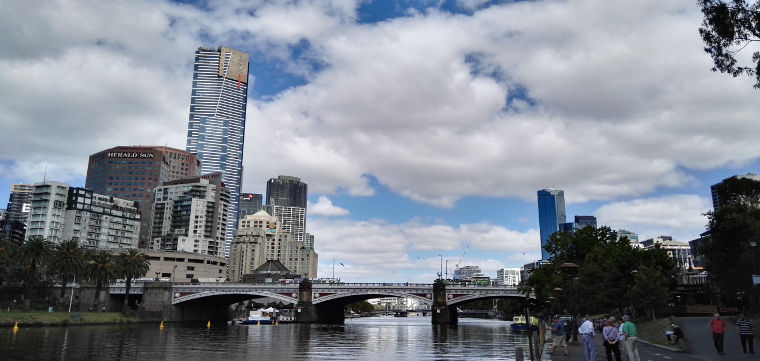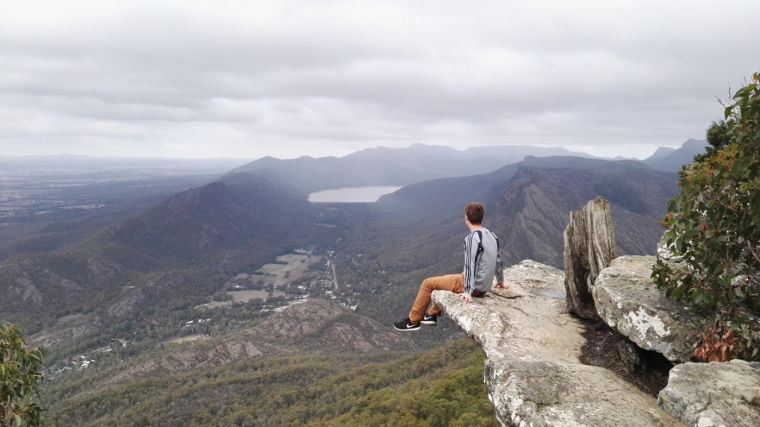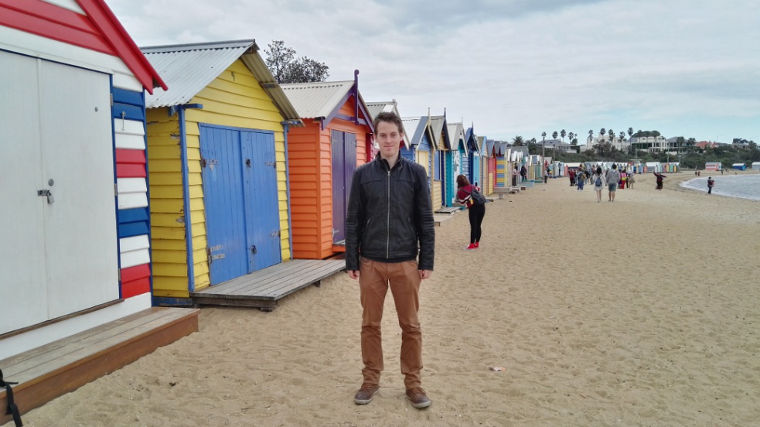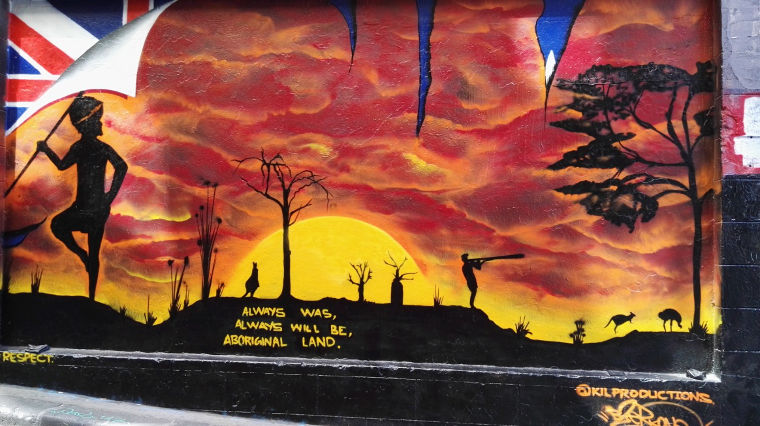Sebastian Ortner | Auswanderer
Zeitraum
2016 - 2018
Was
Bachelor of Exercise Science
Studienprogramm
Bachelor
Förderung
IRH-Förderprogramm
01.01.2018
Mission ‘‘migrating to Australia‘‘
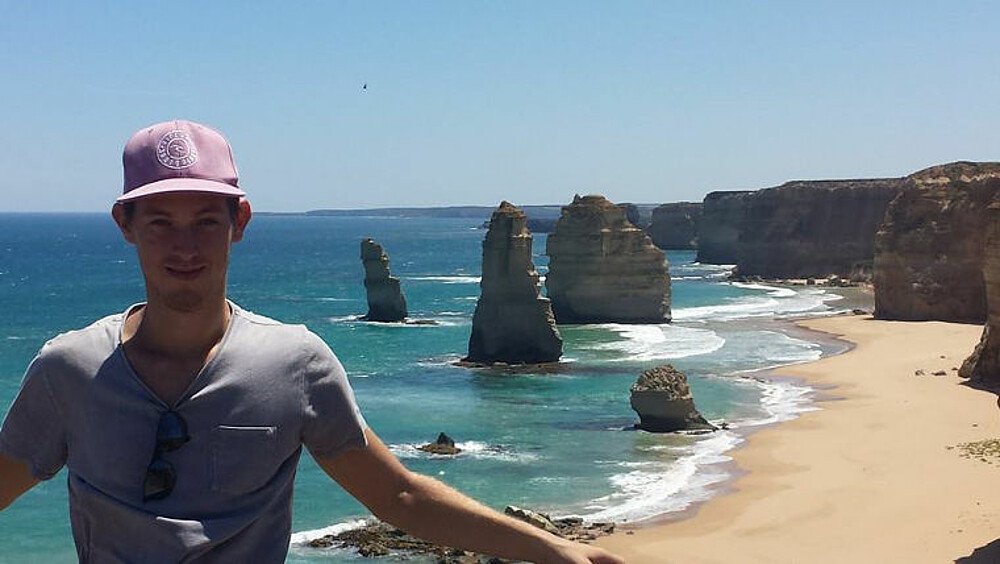
Mission ‘‘migrating to Australia‘‘ started:
I made it! I finally made the decision that I no longer want to live in Germany and try to settle down on the other side of the world. But what made me choose this daring mission? You don’t just wake up one day and tell yourself ‘’I am leaving everything behind and move to the other part of the world’’, do you? Well, in my case it was a long story that made my decision even easier. I spent the last three years travelling in Australia, New Zealand and Asia where two of those three years took part in Australia. I literally fell in love with this beautiful country and it´s amazing inhabitants. Seriously, where else in the world do you find such a multicultural population, consisting of over 200 ethnicities, 16000 km of coastline, packed with magnificent beaches that you usually only see in travel catalogues, over 500 national parks, that most people never even have heard of and animals, that you can only see on television or in zoos? The answer is pretty simple: Nowhere except Australia!
So I had a lot of reasons for making this step and those three years where the best in my life so far: https://www.youtube.com/watch?v=uAeXMkjiO5g
Preparing the move:
Every vision without a plan is only a wish and is doomed to failure. I had a vision but not a plan so far. I was searching in the Internet for useful information and luckily came across the website of the Department of Immigration and Border Protection of the Australian government and found a list called the ‘’Skilled Occupation List’’ (https://www.border.gov.au/Trav/Work/Work/Skills-assessment-and-assessing-authorities/skilled-occupations-lists). To explain it, if your occupation is on this list, you could apply for a ‘’Skilled independent visa (subclass 189)’’ and get permanent residency in Australia. Doesn´t that sound like it could be the answer to my vision?! I absolutely sure it did! The only obstacle is that you need at least 60 points to be considered as a potential candidate, the higher the better obviously. According to this list, you can get already 15 points for any Bachelor degree plus another 5 points for a qualification obtained at an Australian educational institution (http://www.border.gov.au/Trav/Visa-1/189-). Another issue is that the list changes every year, according to the needs of skilled employers. After considering my interests for sports and the fact that the population is aging year by year, I decided to study physiotherapy in Australia.
After choosing Melbourne as my study location and finding two universities that would offer the course, La Trobe University and Monash University, I stood in front of new obstacles. Those were the application process and funding my degree. Luckily I came across the website of https://www.ranke-heinemann.de/ and found out that they accompany people who plan to study in Australia or New Zealand and help with the application process. I also read that they offer to pay 10% of the fees for international students, which made my obstacles smaller. A very generous move of them! So after they helped me to apply for those two universities I got permission for the Bachelor of Exercise Science at La Trobe University because for Physiotherapy you need a score of 1,9 at the Abitur which I didn’t have. But regarding my scores after the first year I would be apply to change into physiotherapy later. Offer accepted, challenge begins…
Arriving at ‘’home’’ again
I still remember the day when I arrived in Australia again. It was the 14th of February – Valentine’s Day. I also remember how I felt. I can´t really put it in words how happy I felt to be back to the country where I had the best time of my live so far. It already started at the airport in Melbourne after I passed the immigration and wanted to exchange some money. ‘’How can I help you Darling’’, was I asked by the lady behind the counter with a smile on her face. For me it was such a big contrast again to come out of Germany where people tend to be cold and serious and back to a country where everyone seems to be curious about your accent and where you might be from. After I told her how much I want to change I was having a chat with her about the coin sizes of Australian money and Euros and how strange it is that 50cent are almost twice the size of 2$. Out of the airport I bought a one way ticket with the Skybus into the city for 18$. The exchange rate when I arrived was around 1€ = 1,5AU$ and the Skybus leaves every 10minutes and is the only way into the city, except you have money for a taxi. After I arrived at the Southern Cross bus terminal in the CBD I took the train to South Morang and from there bus 564 to get to my share house. Melbourne has one of the best public transport systems worldwide and I recommend to download an app called ‘’PTV (Public Transport Victoria)’’ on your phone, which helps a lot when you try to get around. I will inspect the house first and if I don’t like it I am going to stay with a friend until I found something else. But I already saw pictures of the house on the internet and the owner skyped with me and showed me the house when I was still in Germany so I was quite convinced that I will move in. And after doing the inspection I realized that the house looked exactly the same like I saw, so I decided to move in straight away.
Accommodation, or to write it nicer: Living in a multi-culti sharehouse
When I moved in there were already two Canadian girls, one girl from Hongkong and the owner from Indonesia living there. It was a great atmosphere and I found new friends very soon but sadly the two Canadian girls were leaving two weeks after, because they were change to another campus of La Trobe University, which is in Bendigo and about 2hours from Melbourne away. So the next days there was a girl from the Philippines and a Brazilian guy moving in. You see how international Australia is. For the rent I paid 600AU$ per month including wifi, water, electricity and gas. Rent prices are higher in the CBD and near universities and the further out of the city you are the lower the rent. I found 600AU$ a good price, considering how big and beautiful the house was and comparing it to on-campus accommodation which starts at 190AU$ per week. I found this share house on the database for off-campus accommodation of La Trobe University (https://latrobe.studystays.com.au/), but there are also other websites like www.domain.com.au www.flatmates.com.au or even www.gumtree.com.au on where to seek accommodation. I strongly recommend contacting some share house owners before you are arriving already so have one issue less when you arrive and can use the time for exploring Melbourne like I did.
"Whoever seeks shall find" (Charles La Trobe): Studying at La Trobe University:
After using the first week to settle down a bit and to buy necessary things like a pillow, blanket and some groceries, which can be bought at Kmart and Woolworths or Coles, it was finale time to see the place where I will study the next years – La Trobe University.
Before the commencement of the semester on 29th of February, there was an orientation week for international students. Retrospectively, I am very happy that I attended this event, because I was stunned by the size of the campus. I had the feeling that the campus was even an entire town by its own due to its size and that made it very tricky in the beginning to find everything. But to cite the patron of the university, Charles La Trobe, ‘’whoever seeks shall find’’ I managed to find my way after a certain. What I can recommend is to download an app called ‘’Lost on campus’’ if you need some help on how to get to certain points. After enrolling into all my subjects, it was time to start. I only had 4 subjects which were 3 subjects consisting of a two hour workshop each, and one subject taught online. Therefore I had only 6 contact hours on the campus which is very less. I was really surprised by that because when I compare it with the experiences of my German friends it sounds like a dream. But actually it wasn´t, because even if it are just 6 contact hours it is recommended by the university to look at it as it would be a full-time job with 40 hours a week. I would even say that international students should even add a few more hours to be safe. Another difference that I noticed was the size of the workshops and the relation with the tutors. The workshops only consisted of around 20 students, where in one subject half of them even never showed up. It was also quite common to call the tutors by their first name and no by their last name which is usual on universities in Germany. The atmosphere was also very relaxed during the teaching time. After passing the first assessments in each subject I was very happy and saw that all the time effort finally pays.
Job hunting in Melbourne:
Living expenses in Australia are generally a bit higher than in Germany and with a budget of at least 300AU$ per week or 18200AU$, like La Trobe University recommends it, should be planned. Therefore, looking for a job and working part-time is very wise. With the student visa, international students are permitted to work 40 hours every fortnight during semester time and even full-time during semester holidays. You should avoid to work any hours above those 40 hours every fortnight, because if you get caught, a cancellation of your student visa might be a consequence. Also, a study made on international students found out that 15 hours per week was the perfect amount of time on which they still had the best results on their studies. It should also be warned about the exploitation of international students by employees offering those cash in hand jobs with a salary beyond the minimum wage. I had two offers where the salary was 10 and 12$/hr which is way under the minimum wage of 17$/hr and therefore illegal and should be rejected. Good opportunities to look for jobs are www.gumtree.com.au or www.seek.com.au. Another possibility is to make a few copies of your resume and walk to some cafes or restaurants and hand in your resume. That was the way how I got a job at Nando´s which is a Portuguese fast food restaurant. I got a permanent part-time job with a starting salary of 18$/hour.
The city with one of the highest living standards in the world, Melbourne:
If I have learned one thing about Melbourne so far it is, Melbourne never gets boring. Melbourne is Australia´s capital of arts and design and also of sports. Great places to visit in Melbourne are Hosier Lane, if you are into street art and want to see probably the most colorful graffiti in the world, the beautiful Flinders Street Station, Federation Square with the Australian Centre of the Moving Image (entry is free), Queen Victoria Market or St. Kilda if you want to go to the beach and see some penguins for sunset. Melbourne is also the home of some spectacular events like the Australian Open or the first race of the Formula 1 season. I went to the race which was in March and it was very cool to come so close even. Tickets should be bought around Christmas time when there are special offers like 2 for 1 for 74AU$. There are also beautiful places around Melbourne that are worth a visit. One of them is Brighton Beach, on which over 70 colorful beach houses are lined up. Apparently one of those small houses is worth half a million and they are a great opportunity to take a nice picture. Another place to visit is the Grampians National Park which is bigger than Denmark and offers some spectacular views, hikes and wildlife. The duration to get there is approximately three hours by car and cars can be rented from various companies but shouldn’t cost more than 80AU$ per day including insurance. Another great day trip with a car is the Great Ocean Road, which offers spectacular views of the coast between Melbourne and Adelaide.
Useful tips when planning to go to Australia
Living in Australia can be quite pricy so I would recommend seeking for work. All you need is a Tax File Number (https://www.ato.gov.au/uploadedFiles/Content/CAS/downloads/IND6797n2628.pdf), which should be done from Germany already because it will take at least 3 weeks, a bank account (I recommend Commonwealth Bank because it is the widest spread in Australia) and try to get some references from previous employees in Germany, because in Australia it work experience seems more important than the resume
I recommend using Telstra as your mobile phone provider because it is the best option when you are going to remote areas. You should still have reception with it, where as others won’t work
I also recommend buying a bicycle so you are not depended on the bus stop and can drive maybe even to a train station if it is a bit further away. If you have the money, you can also buy a car. Both can be bought from www.gumtree.com.au
Final statement: What do you recon mate?
I think that everyone who has the opportunity to do an exchange semester at least, should take it and shouldn’t be worried about what will come towards him. Especially in Australia, the people are very friendly and new friends from all around the world are found very soon. Also, I think the Australian ‘’no-worries-mentality’’ made me to a more relaxed and appreciate nature and wildlife even more and just showed me that the world is an amazing place if you start getting different perspectives on it. It also helped me to erase some prejudices towards other cultures, and even towards other sexualities like gays. To explain this a bit further, I had a lot of Asian friends there and also one of my best friends was a gay German guy. And to show the most obvious benefit, my English improved a lot.
Go Out, Travel, Grow!
